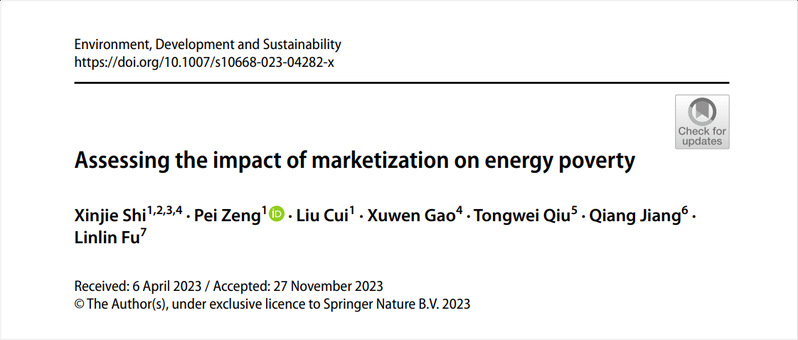近日,浙江大学中国农村发展研究院史新杰研究员及硕士生曾培等合作撰写的论文“Assessing the impact of marketization on energy poverty”在Environment, Development and Sustainability在线发表。Environment, Development, and Sustainability创刊于1999年,是斯普林格(Springer)旗下聚焦于环境及社会经济发展等问题的交叉领域国际期刊,2023年该期刊最新影响因子为4.9。

全文链接:https://link.springer.com/article/10.1007/s10668-023-04282-x
In conjunction with economic growth, improving the quality of life for its citizens is a central concern for the Chinese government. Energy poverty, a topic closely linked to people’s quality of life, has garnered global attention. This study examines the relationship between marketization and energy poverty by constructing provincial-level panel data using the fixed-effect model. To address endogeneity, the instrumental variable method is further employed. The studyobtains two major findings. First, the study reveals a significant upward trend in marketization in China in recent years, with a concomitant decrease in energy poverty. Here, the causal (and negative) effects of marketization on energy poverty are identified. Second, the mechanism analysis shows that this effect operates through (i) improvements in the quantity of energy supply (rather than energy supply efficiency), (ii) the accumulation of human capital that promotes the use of clean energy, and (iii) an increase in people’s income. This study makes three key contributions. First, it empirically analyzes the impact of marketization on energy poverty from a macro perspective. Second, it systematically discusses the pathways through which marketization operates. Third, drawing on several theories, it provides a deeper understanding of the theoretical connection between marketization and energy poverty.
文章概要:中国的市场化改革和发展对于脱贫攻坚取得全面胜利起到了重要作用。本研究利用省级层面的面板数据通过双向固定效应模型及市场化基因这一工具变量,考察了市场化与相对能源贫困之间的因果关系。研究揭示了近年来中国相对能源贫困随着市场化程度上升而下降的趋势。机制分析表明,这种效应是通过(i)改善能源供应数量(而非能源供应效率),(ii)促进人力资本积累从而推动清洁能源使用,以及(iii)增加居民收入而产生的。本研究的贡献在于,从宏观角度实证分析了市场化发展对相对能源贫困的影响,并系统论证了其作用机制。其次,基于多重嵌套理论分析,本文深入梳理了市场化与相对能源贫困之间的理论联系,对中国后脱贫时代政策制定以及相关产业转型发展有一定的借鉴意义。


